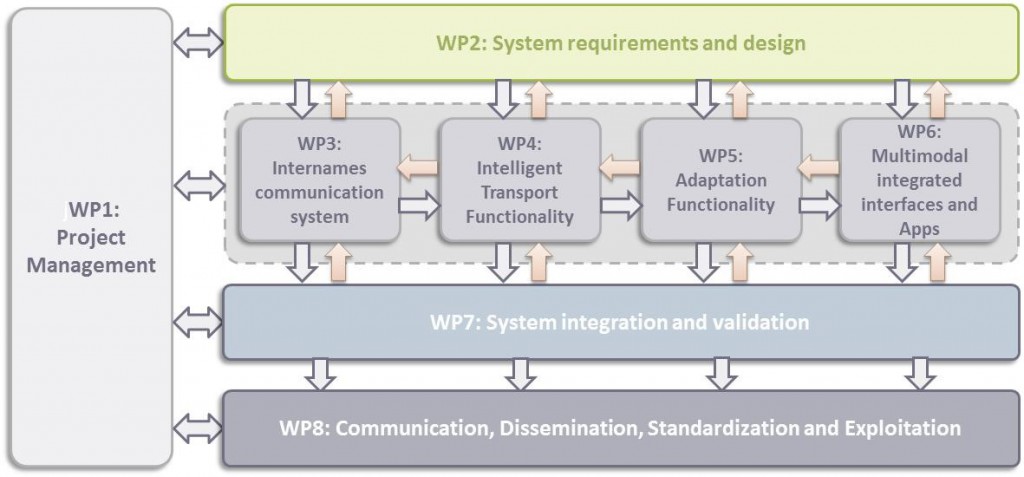BONVOYAGE will last 36 months. The structure of the project is based on three phases: initial requirements and abstractions work package (WP2); component designs (WP3, WP4, WP5 and WP6); integration and validation (WP7). Performance considerations are taken into account from the beginning of the design phase, while the overall system design will be tested and exploited in relevant use cases (WP7). The Management of the overall action (WP1) and the Communication, Dissemination, Standardization and Exploitation (WP8) work packages complete the plan.
WP1 – Project Management will coordinate partner efforts and manage the entire action, at financial, administrative, contractual and technical level.
WP2 – System requirements and design will collect and analyse the system requirements and, on the basis of such analysis, design the system architecture and the detailed interfaces among the BONVOYAGE components.
WP3 – Internames communication system will design and develop the novel Communication System, to enable: seamless connectivity across different existing network realms; native support to mobility and security issues; travel-centric primitives for push/pull based and mobile participatory sensing services; high efficiency in communication and processing operations; graceful deployability and interoperability with existing systems.
WP4 – Intelligent Transport Functionality is responsible for the design and development of the User Profiler Tool, the Multi-Objective Optimization Tool and the Tariff Scheme Design Tool. Proper advanced optimization algorithms will be developed, which, by using as inputs the Context stored in the Multi-Modal Mobility Database, produce, as output, a set of Personalized Control decisions, which are the actual added-value of the project. Software implementation of the designed components is also included in this work package.
WP5 – Adaptation Functionality will design and develop the functionalities necessary to adapt the technology-independent Intelligent Transport Functionality to the specific Transport Operators. First, this WP is responsible for designing and implementing the Multi-Modal mobility Database, which will store the Context and all other information relevant to the functions of WP4. The interface between WP4 and the database is provided by the Database Services, which also provide the interface for the Metadata Handling Tool. Such tool is in charge of producing the Dynamic Present Context. This WP is responsible also for the Service Adaptation which, on the basis of the Personalized Control decisions (output of the Intelligent Transport Functionalities), elaborates one or more Personalized Services tailored on specific Transport Operators’ requirements.
WP6 – Multimodal integrated interfaces and Apps aims at designing and developing all the mechanisms needed to seamlessly interacting with the heterogeneous external actors of the Bonvoyage platform. These interfaces will be dedicated to gather data and information from end users, mobile participatory sensing services, and transport operators and actuate the Personalized Control decisions in the specific technology-dependent external platform. Software implementation of the designed components is also included in this work package.
WP7 – System integration and validation will integrate the software components developed in WP3, WP4, WP5 and WP6 and will perform functional unit and integration tests. Validation will involve the Transport Operators belonging to the consortium.
WP8 – Communication, Dissemination, Standardization and Exploitation will be responsible for the diffusion of project results among interested end-user communities and general public. This will foster EU-wide consolidation and deployment of high-quality integrated multimodal travel information, planning and ticketing services.

